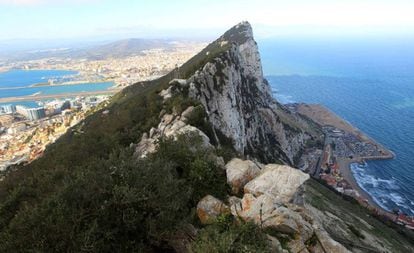
Britain’s imminent departure from the European Union means that Spain is embarking on a special task: negotiating Gibraltar’s own exit from the European club.
In mid-January, the Spanish government and the United Kingdom will begin talks on the British Overseas Territory, a disputed piece of land covering 6.7 square kilometers that sits at the southern tip of the Iberian peninsula. Ceded to Great Britain in 1713 under the Treaty of Utrecht, it has been an enduring source of political friction with Spain.
The priority of the government of Gibraltar is to ensure that our departure from the EU does not negatively affect the lives of citizens who cross the border in either direction
Gibraltar Chief Minister Fabian Picardo
Nearly four years after citizens voted in a referendum, the UK is getting ready to leave the EU on January 31. Although more than 95% of Gibraltarians voted to remain, it will by default stop being part of the EU as a result of Brexit.
This creates a situation that affects Spain uniquely: Gibraltar’s departure will have an impact on a range of issues, including the status of approximately 10,000 Spaniards who work in Gibraltar as cross-border workers.
As for the post-Brexit scenario, involving Europe’s relationship with the territory – where Spain holds a veto right – Madrid is working on a series of “red lines” with the ultimate goal of aligning the conditions on both sides of the border separating Gibraltar from La Línea de la Concepción and the wider Campo de Gibraltar, in Cádiz province, an area with high unemployment rates.
In late 2018, Madrid and London dealt with what is known in diplomatic language as “irritants.” Now, both governments will create committees to address each of these contentious issues, said Marco Aguiriano, Spain’s secretary of state for the European Union, in a conversation with EL PAÍS.

Technical delegations from both countries will meet in Madrid on January 14 and 15 to set a timetable and an agenda for the meetings. The goal is to deal with any tension or misunderstanding that might arise during Britain’s departure and during the transition period extending to December 31, 2020.
The committees mirror the four memorandums of understanding that Madrid and London signed in November 2018 to tackle issues of concern such as the rights of cross-border workers, the fight against smuggling, environmental protection, and cooperation on law enforcement and border control.
Those topics are being bundled into three committees that will attempt, among other things, to disincentivize tobacco smuggling from Gibraltar, which is the biggest entry point for illegal tobacco products into Spain. Madrid is also targeting Gibraltar’s practice of expanding its territory through landfill in disputed waters. The committees will additionally attempt to define clear tax residency rules.
The British delegation will include representation from the government of Gibraltar, while the Spanish one brings on board regional and local officials. A fourth committee presided by the European Commission will address the status of around 15,000 EU citizens who work in Gibraltar, most of whom are Spanish.
We are almost done defining the priorities and red lines
Marco Aguiriano, Spanish Secretary of State to the EU
Around 28,500 people cross the border daily, and keeping traffic flows smooth is a priority for all parties involved. “The priority of the government of Gibraltar is to ensure that our departure from the EU does not negatively affect the lives of citizens who cross the border in either direction. By working together, we can ensure smooth border flows for all interested parties,” said Chief Minister Fabian Picardo in a written reply to this newspaper.
As for the British government, it is being very reserved about the priorities it will bring to the negotiating table. “We are committed to all the agreements described in the Withdrawal Agreement. Together with the government of Gibraltar and the kingdom of Spain, we will apply the Gibraltar protocol and associated commitments,” said a spokesperson in Madrid.
As for the future trade relations after December 31, 2020, Spain is preparing a document to send to Brussels in early January. “We are almost done defining the priorities and red lines for the European negotiation mandate in the trade agreement to be negotiated with the UK,” said Secretary of State Marco Aguiriano.
English version by Susana Urra.
